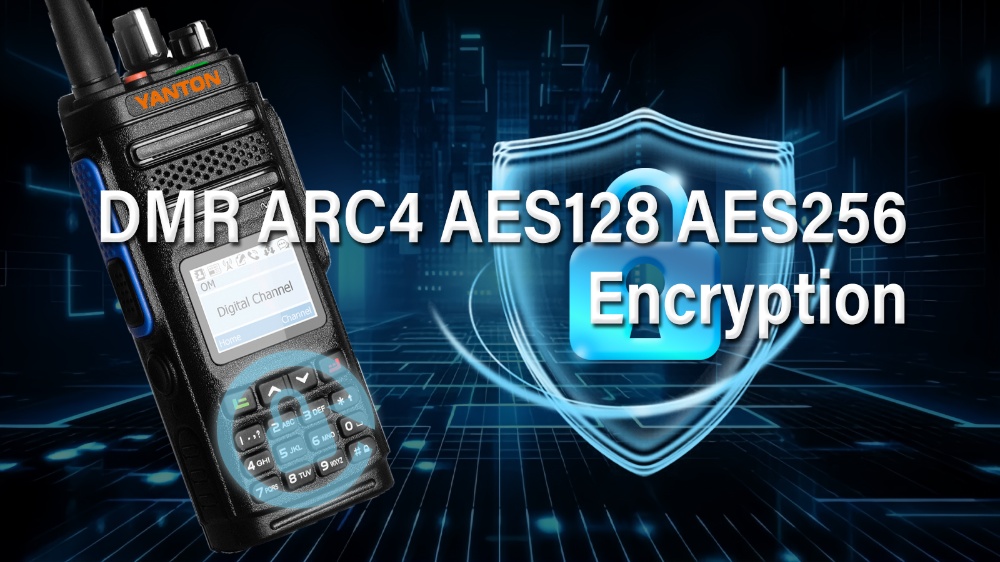
DMR ARC4 AES128 AES256 Шифрование

Шифрование в DMR
Цель шифрования в DMR — предотвратить прослушивание ваших передач неавторизованными слушателями. Цифровые голосовые данные кодируются с помощью секретного «ключа». Только радиостанции, запрограммированные на тот же ключ, могут расшифровать и чётко услышать аудио.
DMR поддерживает несколько алгоритмов шифрования, которые существенно различаются по стойкости.
ARC4 (Предполагаемый RC4)
Что это: Поточный шифр, то есть шифрующий данные по одному биту за раз. Он очень быстрый и простой в реализации. Название «Предполагаемый» связано с его историей: это был запатентованный алгоритм, который был подвергнут реверс-инжинирингу и опубликован анонимно.
Сложность: Очень слабая. ARC4 имеет хорошо известные криптографические уязвимости и считается устаревшим и несоответствующим современным стандартам безопасности. Его можно сравнительно легко взломать с помощью широко доступного программного обеспечения.
Использование в DMR: в радиостанциях это иногда называют «базовым шифрованием». Этот метод предлагается как недорогой вариант, поскольку не требует больших вычислительных затрат. Его следует использовать только для обеспечения конфиденциальности, чтобы предотвратить случайное прослушивание, а не для защиты конфиденциальной информации. Многие современные радиостанции отказываются от его поддержки.
AES (расширенный стандарт шифрования)
Что это: Блочный шифр, то есть шифрование данных блоками фиксированного размера (128 бит). Это всемирный стандарт, принятый правительством США и используемый по всему миру для защиты всего: от онлайн-банкинга до секретных документов.
Сложность: Исключительно сильная. AES — золотой стандарт шифрования. Не существует практических атак, способных взломать правильно реализованное AES-шифрование за разумное время.
В DMR AES реализован с двумя длинами ключа:
AES128
Использует 128-битный ключ. Это означает, что существует 2^128 возможных комбинаций ключей — астрономически большое число.
Надежность: Исключительно высокая. Считается безопасным для всех типов данных, кроме самых строгих и долгосрочных (например, для совершенно секретных правительственных данных, хранящихся десятилетиями). Для практически любых коммерческих, промышленных и общественных нужд AES128 более чем достаточен и настоятельно рекомендуется.
AES256
Использует 256-битный ключ. Это ещё больше, с 2^256 возможными комбинациями.
Стойкость: Стойкость «военного уровня». Для большинства приложений она избыточна, но используется организациями, которым требуется высочайший уровень безопасности, где важны будущие достижения в области вычислений (например, квантовые компьютеры). Требует немного большей вычислительной мощности, чем AES128.
Сравнительная таблица
|
Особенность |
АРК4 |
AES128 |
AES256 |
|
Тип |
Потоковый шифр |
Блочный шифр |
Блочный шифр |
|
Длина ключа |
Обычно 40-бит (слабый) или 104-бит |
128-бит |
256-бит |
|
Безопасность |
Слабый (сломанный) |
Очень сильный |
Чрезвычайно сильный |
|
Скорость |
Очень быстро |
Быстрый |
Немного медленнее |
|
Рекомендация |
Избегать. Использовать только для сокрытия сведений. |
Да. Идеально подходит для большинства безопасных применений. |
Да. Для обеспечения максимальной безопасности. |
|
Стандартизация |
Устаревший, нестандартный |
Стандарт НИСТ |
Стандарт НИСТ |
Важные соображения по поводу шифрования DMR
Управление ключами: Самая большая проблема — не алгоритм, а управление ключами. На всех радиостанциях в разговорной группе должен быть запрограммирован один и тот же ключ. В случае потери или кражи радиостанции ключ становится недействительным, и вам придётся менять ключ на каждой радиостанции в системе — настоящий логистический кошмар.
OTAR (беспроводная смена ключей): в системах более высокого уровня используется технология OTAR, которая позволяет сетевому менеджеру безопасно отправлять новые ключи шифрования по радиоканалу всем устройствам, упрощая управление ключами.
Совместимость: Не все радиостанции разных производителей поддерживают все типы шифрования, особенно проприетарные варианты. Для смешанных парков устройств AES — оптимальный выбор, поскольку это универсальный стандарт.
Законы и правила: Во многих странах использование шифрования на радиочастотах может требовать лицензии или иметь определённые ограничения. Всегда сверяйтесь с местными правилами.
Краткое содержание
DMR — это система цифрового радио.
Шифрование — это дополнительная функция для шифрования голосовых данных в этой системе.
ARC4 — старый и слабый алгоритм, которого следует избегать для чего-либо важного.
AES128 — это современный и надежный стандарт, который идеально подходит практически для всех защищенных коммуникаций.
AES256 — сверхпрочная версия, отвечающая самым высоким требованиям безопасности.
Для любого серьезного случая использования (безопасность бизнеса, общественная безопасность, коммунальные услуги) всегда следует выбирать шифрование AES (128 или 256) вместо ARC4.
© авторское право: 2026 QUANZHOU YANTON ELECTRONICS CO., LTD. Все права защищены.

IPv6 network supported